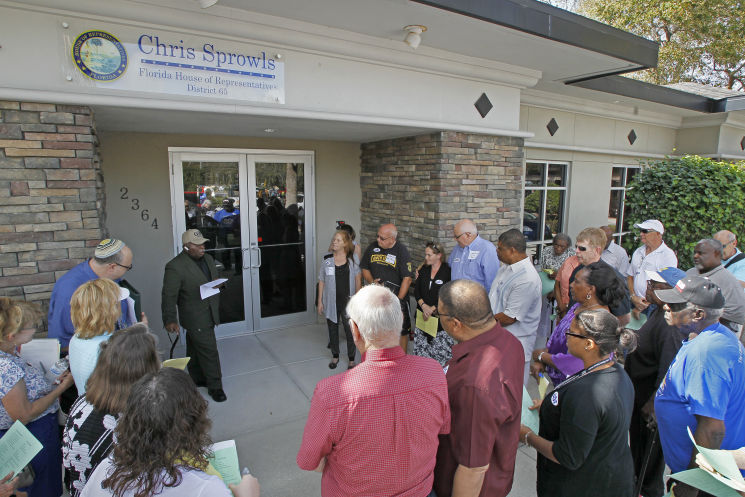March 2, 2017. Tampa Bay Times.
PALM HARBOR — At 26, Samantha Hernandez still remembers her 12-year-old self perusing the jewelry section of the Beall’s store in Lehigh Acres and spotting the $8 necklace with its fake sparkly diamonds.
She says she had the money and wanted to buy it. But an employee approached Hernandez and told her to leave. As she and a friend stepped outside, Hernandez realized she still had the necklace.
Store employees called the police. Hernandez was handcuffed, placed in a patrol car and whisked off to the police station, where officers took her fingerprints and searched her.
“They were treating me like a 30-year-old criminal. It was terrifying,” Hernandez said. “It was horrible all the way around.”
Hernandez shared her story Thursday afternoon in front of about 40 members of the Faith and Action for Strength Together.
The Pinellas-based coalition of congregations gathered at state Rep. Chris Sprowls’ office to show their support for a measure that will require law enforcement officers across Florida to give civil citations to juveniles for 11 offenses, from criminal mischief and petty theft to trespassing and drug possession.
Under current law, police have discretion in deciding which juveniles receive a civil citation, but critics point to Department of Juvenile Justice numbers in 2016 that show the citations are used inconsistently.
In Pinellas County, where a diversion program for juveniles has been in place for years, 94 percent of eligible juveniles received civil citations. But across the bay in Hillsborough, it was 36 percent.
“What’s unfair is that we’ve got a sheriff who does a fabulous job with our local diversion program,” said Rabbi Michael Torop of the Temple Beth-El in St. Petersburg. “That same reasoned, just approach to how we deal with misdemeanors for youth offenders is not followed across the state.”
Throughout Florida, 52 percent of minors got civil citations.
“We still have too many children being arrested for some very minor offenses,” said state Rep. Larry Ahern, R-Seminole, who filed the House version of the bill.
The bill, which has companion legislation in the state Senate, will require that civil or diversion programs for juveniles be utilized in every county. Juveniles typically are required to complete community service hours and pay restitution.
An arrest can follow a minor into adulthood. Even if their record is expunged, the arrest can still show up in some background checks.
In Hernandez’s case, her record surfaced when she applied for jobs or college. After her arrest, she completed several courses and wrote a letter of apology to the store. She was told the arrest would be removed from her record once she turned 18.
“It’s still there and they can still see it, and it makes them look at me like a bad person sometimes,” said Hernandez, now a chiropractic assistant and office manager for an Oldsmar facility.
On Thursday, nearly 40 members of FAST prayed and sang outside Sprowls’ Palm Harbor office. He is the chairman of the judiciary committee, which will consider the bill. Sprowls was not at his office, so they spoke with his legislative assistant.
When asked about his position on the proposal, Sprowls said on the phone that using diversion models is an “achievable” goal as long as law enforcement has “some discretion and flexibility.”
“I think that that’s something that we can do this session,” he said.
Ahern said Thursday that Sprowls has been working closely with him and state Sen. Anitere Flores, R-Miami, who filed the Senate version. They anticipate filing a few amendments to the bill, such as waiving any fees to expunge records and allowing juveniles to deny they have been arrested if they’ve successfully completed a civil or diversion program.
“It really just wipes everything clean. They can say, if asked, ‘No, I’ve never been arrested. No, I’ve never been part of a diversion program,’ ” Ahern said.
Some demonstrators on Thursday wore papers taped to their shirts listing the petty crimes they committed as kids, like “shoplifted a toy gun,” “threw rocks at bike riders” and “sleeping on the beach.”
“We want every kid to be able to have the same opportunities that our children here in Pinellas have,” Hernandez said.
View original article.






